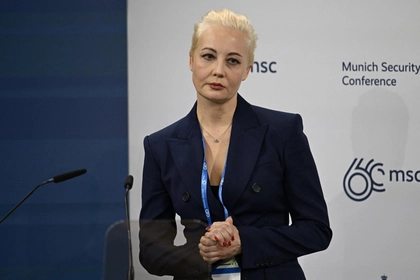The Faces of Russian Resistance is a series of exhibitions to be held in over 30 different cities around the world highlighting 16 politicians, activists, artists and public figures held by the Kremlin on political charges.
The series was organized by a group of Russians who oppose the government of Vladimir Putin, many of whom fled Russia under threat from the current regime. It began in Zurich, Switzerland in October 2023 and its latest port of call is Beursplein, Amsterdam, the Netherlands, where it began on May 28 and will run until June 15.
JOIN US ON TELEGRAM
Follow our coverage of the war on the @Kyivpost_official.
The exhibition describes those featured as heroes – men and women, young and old, political activists, artists, scientists, students, fathers and mothers. They are ordinary citizens who have one thing in common: they have been imprisoned because they want to free Russia from the tyranny and false propaganda that led to the invasion of their neighbor, Ukraine.
The purpose of the exhibition, according to the organizers, is to tell Western society the truth about the fate of Russian political prisoners, to draw attention to the ongoing severe violations of human rights in Russia, and to ensure that the issue is included in all ongoing or future communications with the Russian authorities.
According to the Nobel Peace Prize-winning human rights group Memorial, more than 700 individuals are held in Russian prisons because of their political beliefs, many of whom were jailed for opposing the war in Ukraine. The group says that since February 2022, when President Putin initiated his so-called special military operation, the level of repression in the country has increased with more being incarcerated every day.

Navalnaya Admits Has ’No Plan’ Ahead of Russian Anti-War Berlin March
The Moscow Times quotes a former Moscow municipal deputy who fled after being prosecuted for her anti-war views saying, “This exhibition is an opportunity for Russians to tell the world what is happening in the country.”
One of those who is included in the exhibition is opposition politician Vladimir Kara-Murza, who was sentenced to 25-years in prison in April 2023 on charges of disobeying police orders, “discrediting” the military, and treason, especially after he criticized the invasion of Ukraine.
The death of Alexei Navalny, who also features in the exhibition, in an Arctic penal colony in February, which many blame on Putin, has added to concerns about the safety of others jailed for criticism of the Kremlin.
Both Navalny and Kara-Murza survived poisoning attacks believed to have been engineered by agents of Moscow’s security apparatus and Amnesty International among others has voiced protests about the conditions and health of other prisoners of conscience.
The Faces of Russian Resistance exhibition, in Beursplein, Amsterdam. Photo: Facebook
The exhibition does not only feature politicians: Aleksei Gorinov, 62, was sentenced to seven years in prison objecting to a pro-war children's dance and drawing competition.
Natalya Filonova, a 62-year-old pensioner jailed for three years for allegedly attacking police during protests against Russian mobilization in the fall of 2022.
Russian journalist Maria Ponomarenko, 45, jailed for six years for spreading “fake news” after reporting about the March 2022 strike on the Mariupol Drama Theater in which civilians were sheltering.
33-year-old artist Alexandra Skochilenko who was sentenced to seven years for attaching anti-war statements to price tags at a local supermarket.
Evgenia, Kara-Murza’s, was the special guest at the opening of the Amsterdam showcase, where she told the Moscow Times that the fight to free Moscow’s political prisoners by educating politicians in Western capitals with the exhibition and other initiatives was vital.
“Maybe if we talk about it, there will be more support and maybe these people might survive,” Kara-Murza said.
You can also highlight the text and press Ctrl + Enter







